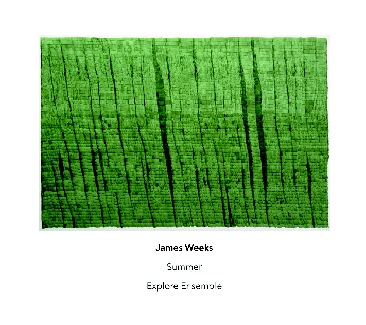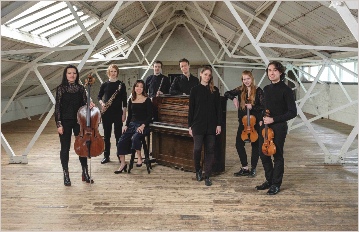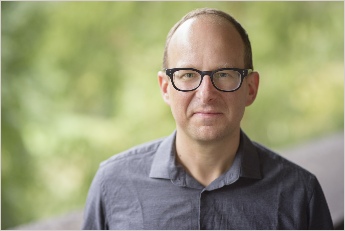Another Timbre TimHarrisonbre

at174 James Weeks ‘Summer’
Five chamber works played by Explore Ensemble
1. ‘Summer’ (2016) 13:44 youtube extract 1
2. ‘Violet’ (2018) ‘Violute’ (2018) 10:30
3. ‘Düsseldorf’ (2017) 11:30 youtube extract 2
4. ‘Durham’ (2017) 4:18
5. ‘Siro’s Garden’ (2018/20) 30:10
Taylor MacLennan (flutes) Alex Roberts (clarinet) Oscar Holch (viola) Deni Teo (cello)
David López Ibáňez (violin) Siwan Rhys (piano & harp) George Barton (percussion)
Angela Wai-Nok Hui (percussion) Nicholas Moroz (electronic realisation)
Interview with James Weeks
The pieces on your new CD were all written at roughly the same time. Are they loosely connected as a series or are they totally separate works?
They were all written separately, on different impulses, although by the time I started planning Siro's Garden I had already realised that the others could be part of a coherent sequence. So in that piece I was aware of tying them together as a set, by continuing and extending certain poetic ideas, ways of using and combining instruments, and ways of thinking about material, that I'd started exploring in the shorter pieces. Things like the use of mixed instrumental duos, which comes from Violet-Violute, the use of a slow-moving or static background harmonic layer, which comes from Summer, the overall very soft and intimate instrumental idiom based on long, breath-length sounds, which appears in all the pieces other than Durham. And finally of course the poetic idea of a piece as opening up an imaginary (or remembered) space: music which unfolds as an area or a field, for the listener to wander in without having to follow a complex series of narrative events.
Do 'Durham' and 'Düsseldorf' invoke the cities that give them their name in any way? Is it programmatic music at all?
Sort of, but also sort of not. There's obviously a feel of 'evocation' about all the pieces on the disc, and inevitably that's the way-in for many people hearing them for the first time. I'm interested in the atmospheres of places, of particular moments in particular environments, and I don't feel embarrassed about incorporating these as affective images - or perhaps 'conceits' in the poetic sense - directly into my work. But at the same time I'm not trying to 'portray' them, as a 19th-century composer might: I just let the idea or the memory sort of colour the choice of material and the overall form the music takes, whilst composing in an essentially abstract way with the materials. In Durham, for example, I used the notes of Cathedral's Angelus bells to start the composition off, but then I simply wrote a piano piece, using a restricted harmonic palette of just 4 pitches. Actually this piece was written in homage to Howard Skempton for his 70th birthday, so I was also thinking about what our musics have in common. He too uses evocative titles for what are essentially non-representational works, and I love the interesting tension that gives to the way we listen to them: 'What does this piece have to do with its title?' Düsseldorf is another case in point: on one level it's a transcription of ten minutes I once spent in a garden in the city, listening to two bells from different churches and the way they coloured the whole sonic environment. But there's no narrative: the piece is an exploration of its materials and how they interact together. It's also another homage, as it's the city of Wandelweiser and Klangraum, which was why I was there, rehearsing for a concert - a way of marking an association with music, and a way of being in the world as a musician, that I love and feel close to.
What about ‘Summer’? Where does that come from, and what are its associations?
I don’t remember much about the genesis of Summer, which I wrote in 2016, not for any occasion or any particular ensemble. I think it was literally as simple as finding those two chords at the piano one day while working on another piece, and wanting just to sit with them for a while. The rest of the texture grows out of them, simply as amplifications, prolongations and distortions of their constituent pitches. At the time I was getting very involved with ways of working with modal harmony and triads in different tuning systems – something I’m still very interested in – so the way this piece incorporates equal temperament (the piano), Just Intonation (the keyboard/tape part) and looser, approximate inflections (the other instruments) is typical. I had in mind the kind of ripeness you get in fruits where their texture is just slipping into overripe – still holding their shape, but on the verge of becoming pulpy and soft, when decay is just about to begin. I think there’s maybe an emotional parallel here in that sense of late-summer stasis, and a sort of melancholy I associate with it: I definitely feel that in the tonal ambiguity of the chords, and the piece really grew out of those associations.
And ‘Violet – Violute’; even having recorded it, I’m not sure if it is a single piece or two pieces combined. How does it work and what are the underlying ideas?
They are two different pieces! Ages ago I jotted down the idea to make a piece called Violet, for viol-in and clarin-et – yes, really – something small and intimate where the two instruments would sound as one. Later I had the opportunity to do something for viola and bass flute, so I called that Violute and then went back and wrote Violet afterwards. Both pieces are fundamentally very simple, listening in to inflections of a single harmony in different ways. It was fascinating to write so microscopically, working with the tiniest differences of inflection or timbral combination (including singing-and-playing).
Finally ‘Siro’s Garden’. You explain on the CD cover that the piece refers to Siro, an Epicurean philosopher, and notions of harmony with the natural world, but can you tell us more about the texts used, and how the piece developed musically?
I’d been thinking about Virgil’s Georgics for a while. I was looking around for texts concerning humanity and the natural world, as that’s been a preoccupation of my music for a long time (for example in windfell, at139), and I often find literary sources germane to my writing, whether or not they appear in the final piece. The Georgics are an epic-didactic poem, partly in imitation of Lucretius’ De rerum natura, dealing with farming, and more generally with humanity’s relationship to the land and to the natural world. I found the famous passage in which Virgil directs a prayer to the Muses to teach him understanding of the world (in the scientific, Lucretian sense), but that if it is not in his nature to understand it intellectually, that he may nevertheless love it (i.e. to apprehend nature in a directly sensual and emotional way). This resonated with me, particularly in the way it sensitively explores the different modes by which we encounter and live in the world, which is paralleled of course in the way we respond to art. I decided to use the text, and its notion of a multi-modal response to the world, as the basis of a piece, which became Siro’s Garden.
I set the text in two ways: firstly, I set it ‘in the world’, in a garden: the garden of Virgil’s teacher Siro, an Epicurean philosopher at whose school near Naples Virgil was resident as a young man. The whole piece is an imaginary recreation of a scene in this philosophical retreat: the different instruments spread around the stage, singly or in groups of two, as if inhabiting a garden, contemplating, reading, or writing poetry: their music, always very soft, is the sound of their inner thoughts. The passage from the Georgics is read through at the start, and the music – and the scene itself – seem to take shape out of it.
The second setting is musical: each word of the text is assigned a phrase of music – a single tone or melodic line, sounded in a single breath/bowstroke – played by each of the three duos (alto flute-violin; clarinet-viola; bass flute-cello). It takes these trios the entire length of the piece to articulate the 12 lines of poetry in this way: each word is announced softly by the violinist as it plays the associated phrase, so if you listen closely you can hear where we have reached in this very slow ‘recitation’.
Another layer to the work is harmony. I use 12 different tetrachord-based scales, some authentic Ancient Greek tunings and some I invented. I allocated one to each line of poetry, and you can certainly hear a movement between diatonic, chromatic and microtonal (‘enharmonic’, in the Greek terminology) harmony in the instrumental parts. But at the same time they get overlapped and mixed up with other layers – the tape part and the two Celtic harps – so in the end, like Virgil trying to apprehend the world, we have to stop trying to tease apart these constituent parts and take in the overall harmonic effect.
Finally I should mention the Celtic harps, which complete the image of an Epicurean garden of quiet contemplation, adding fluidity to the texture and distantly evoking the sound of lyres (fleshing out the conceit, or allegory, of the work). A feature of the piece is the retunings that they have to undertake between each of their passages.
It might be useful for listeners to have Virgil’s lines:
Me vero primum dulces ante omnia Musae,
quarum sacra fero ingenti percussus amore,
accipiant caelique vias et sidera monstrent,
defectus solis varios lunaeque labores;
unde tremor terris, qua vi maria alta tumescant
obicibus ruptis rursusque in se ipsa residant,
quid tantum Oceano properent se tingere soles
hiberni, vel quae tardis mora noctibus obstet.
sin has ne possim naturae accedere partis,
frigidus obstiterit circum praecordia sanguis,
rura mihi et rigui placeant in vallibus amnes,
flumina amem silvasque inglorius.
Virgil: from Georgics, II.475-486
As for me, may the sweet Muses, supreme above all,
whose rites I celebrate, stirred by a great love,
receive me, and show me heaven’s roads, and the stars,
the sun’s many eclipses, the moon’s labours,
where earthquakes come from, forces that swell the deep seas,
bursting their barriers, then sinking back again into themselves:
why winter suns rush so to dip themselves in the ocean,
and what it is that holds back the slow nights.
But if the chill blood around my heart prevents me
from reaching those regions of nature,
let the country and the flowing streams in the valleys please me,
let me love the rivers and the woods, unknown.
tr. A.S. Kline


James Weeks
Explore Ensemble